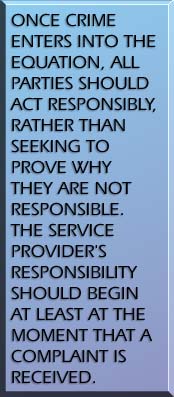


 f all the bickering in and out of court over the policing of cyberspace, the case that had opponents of regulation most concerned is the libel suit brought by brokerage firm Stratton Oakmont of Lake Success, N.Y., against on-line services provider, Prodigy Services.
f all the bickering in and out of court over the policing of cyberspace, the case that had opponents of regulation most concerned is the libel suit brought by brokerage firm Stratton Oakmont of Lake Success, N.Y., against on-line services provider, Prodigy Services.
Although the case was finally resolved in October, it has left unanswered one of the most significant questions underlying the future of regulation on the Internet: who is responsible for anonymous postings when their content or effect is illegal?
One of Prodigy’s bulletin boards, “Money Talk,” is an on-line discussion group for users with an interest in finance and investments.
In October 1994, a series of anonymous postings appeared on Money Talk accusing Stratton Oakmont of fraud, its president Daniel Porush of being a criminal, and describing the firm as “A CULT OF BROKERS WHO EITHER LIE FOR A LIVING OR THEY GET FIRED.”
Judge Stuart L. Ain of the New York Supreme Court in Mineola upheld Stratton Oakmont’s libel claim, stating that Prodigy acted in a manner comparable to a publisher, in that it exercised some editorial control over bulletin board content, and thus was responsible for the content of the material aired via its system.
To the relief of other service providers who feared they would be held to the same “publisher” standard, this decision was voided when Stratton Oakmont agreed not to oppose Prodigy’s challenge of the ruling in exchange for an apology from Prodigy.
Whatever Judge Ain includes in his final written ruling, industry insiders consider Prodigy’s “victory” a temporary one at best. Mark Voorhees, editor of the Information Law Alert, summed up the opinion of the no-regulation faction: “It’s a good victory, but I don’t think this is the last court battle on this issue.”
Throughout the trial, the debate centered on whether or not Prodigy could be held accountable for illegal (in this case, defamatory) activities made possible by the services it provides.
Prodigy’s argument — that it is not responsible and that it can not, or will not, identify an anonymous perpetrator — has one major problem:
It leaves no one else to be responsible.
This presents a vision of the Internet as an international crime sanctuary in which unlimited unlawful activity can occur, apparently with the full endorsement of the “no-regulation” advocates.
This does not coincide with the stated views of the majority of service providers, including Prodigy, whose membership agreements include rules that prohibit illegal activity.
In contrast with such responsible statements, Prodigy was forced into some fine post-agreement rhetoric to maintain the not-responsible stand. Prodigy spokesman Brian Elk explained that his company did not apologize to Stratton Oakmont — but only said they were sorry. The difference: “To apologize is taking responsibility” said Mr. Elk. “‘Sorry,’ is saying that we can sympathize but it wasn’t our responsibility.”
Richard Kurnit, partner in a new law firm hired by Prodigy, says that Stratton Oakmont would ultimately never win a final decision in the libel case anyway. “They haven’t got a prayer. They’re a public figure. They have to prove reckless disregard for the truth.” Kurnit says this would be impossible to prove since Prodigy did not even see the offending notices until two weeks after they were posted.
But whatever the truth or falsity of the allegations in the Stratton Oakmont case, and regardless of the legal outcome, the problem of anonymously posted illegal messages will remain.
As Walter S. Mossberg wrote in the Wall Street Journal about computerized discussion groups, “When these forums operate under the cloak of anonymity, it's no different from printing a newspaper in which the bylines are admittedly fake, and the letters to the editor are untraceable. It sure makes it easier to spread wild conspiracy theories, smear people, conduct financial scams or victimize others sexually.”
Stratton Oakmont’s attorney Jacob Zamansky claims that the $200 million libel suit was filed only after a call to Prodigy to get the on-line service provider to voluntarily remove the defamatory statement failed to meet with any willingness to cooperate.
Whether or not they are to be held legally culpable, service providers will not escape the problem — as long as they permit anonymous postings — by saying they are not responsible.

The publisher of one of the newsletters, “Rumorville” accused the new newsletter, “Scuttlebut” of stealing Rumorville’s information.
The Manhattan federal district court found that CompuServe could not be held accountable for the alleged libel in this dispute.
Bruce Keller, a New York attorney who filed an amicus brief in the later Prodigy case, says this decision “is good law. ... It makes perfect sense.”
It may make perfect legal sense that CompuServe is not legally responsible, but as Oliver Wendell Holmes pointed out long ago, “the life of the law is not logic.” What supposedly makes legal sense is actually an ethical nightmare where no one is responsible for an illegal act. That “logic” prevails only in courtrooms and Wonderland.


Bulletin boards featuring anonymous postings don’t just offer an opportunity for apprehension-free crimes against big businesses. Individuals and small business owners can be unjustifiably harmed as well.
Another current example of the problems caused by anonymity on the Internet concerns a message posted on a bulletin board operated by America Online.
In June this year, an anonymous user calling herself Jenny TRR described a recent holiday in the Caribbean, noting that she had a less than pleasant experience with a diving instructor who was drugged while teaching her to dive. The diver and resort were discussed clearly enough to identify who was being discussed to anyone familiar with the area.
Arnold Bowker, the resort owner, posted a notice on the bulletin board asking the author to recant. When no apology appeared, Bowker decided to sue for damages — claiming that a large portion of his business came through computer correspondence and there was no doubt the remark had caused damage.
As the message was posted anonymously, Bowker is suing America Online to obtain the identity of the author.

One remedy for the problem of anonymously distributed illegal messages would be to hold those who “remail” messages responsible in the event of any harm or illegality. The remailer provides the service of anonymity by removing the identity of the sender.
Alternatively, it may be possible to develop a means of identifying messages for law enforcement purposes if it turns out that a tort or crime has been committed.
Abraham Haddad, chairman of the computer science department at Northwestern University, commented that anonymity should be protected “as long as no laws have been broken.”
But what if laws are broken?
Once crime enters into the equation, all parties should act responsibly, rather than seeking to prove why they are not responsible. The service provider’s responsibility should begin at least at the moment that a complaint is received.
Ultimately, the solution has more chance of being Internet-friendly if it is born out of a decision by on-line service providers themselves that someone has to be responsible.

